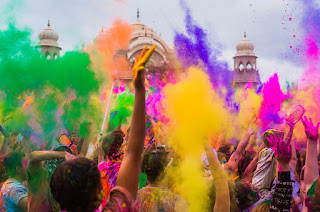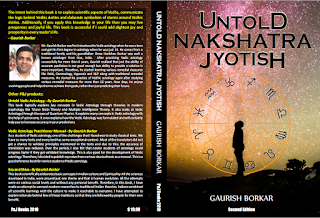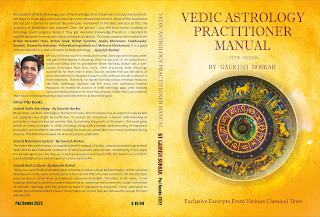Holi Hai!!! – Plan for a prosperous and joyful new year
Every
Indian festival has a purpose and the purpose is relevant even today. Today I
want to discuss a bit about structure of an Indian year and purpose of Holi.
As you may be aware, Indian culture has
3 key gods i.e. Branhma, Vishnu and Mahesh or Shiva and similarly 3 goddesses
i.e. Devi Saraswathi, Mahalakshmi and Mahakali. The roles of the 3 gods and
goddesses are also defined. Brahma and Devi Saraswathi are creators, Vishnu and
Mahalakshmi are nurturers finally lord Shiva and Mahakali are destroyers. Lord
Ganesha is also considered as representation of Brahma.
According to Hindu philosophy this
cycle of creation, nurturing and destruction is a continuous cycle. Shree Swami
Vivekananda gave an analogy of waves in an ocean to this cycle. Another
interesting principle in Vedic literature is “Yatha Pinde tatha brahmande| Yatha
Brahamande tatha Pinde” or what you observe at micro level is also observable
at mega level or vice versa. This is perfectly scientific based on holographic
theory in quantum physics. Therefore, Hindus considered a year as a section of infinite
time.
Hindu festivals in a year are also
organized around this theory of creation, nurturing and destruction. The beginning of the year is with festivals of
Lord Ganesha and Devi Saraswathi. Later for quite some time lord Vishnu is worshipped.
This includes Aashadhi and Karthiki Ekadhashi. In the month of Ashwin i.e. 6th
month when half a year is about to get over we offer our prayers to Lord Vishnu
on the day of Dhanathrayodhashi and request for good health. On the new moon
day or Aashiwn Amavasya, we offer our prayers to Devi Mahalakshmi and request for
good wealth. Finally, the year ends with Mahashivarathri where we offer prayers
to lord Shiva the destroyer.
Holi comes after Mahashivrathri when a
Hindu year is about to end, and a new year is going to begin in just 15 days. These
are last 15 days of Shishir Rhutu or season. During Shishir season trees shed
their leaves. The Hindus has always learnt from nature and complimented the
nature as well. As the summer is about to start, these shed leave and trees may
become reason for forest fire and so the suggestion is to burn the leaves and dried
trees. This is also time to pray the forest gods and goddesses for happy and mishap
less summer in the forest.
In some cultures, on the day of Holi people
use bad words against each other and this is totally acceptable. In some other
cultures people play along with family and friends using colors or mud. The
whole purpose of this is to forget everything that happened in the year and have
a fresh start on new year day. Cultures where bad words are acceptable suggest taking
out the frustration or grudge and be friends whereas cultures where people play
colours suggest being friends by forgiving everything that happened in last
year.
During the fortnight after Holi, Shraddhas
for ancestors are performed. This is to resolve unhappiness of ancestors or fulfill
any of their wishes.
This whole concept is very similar to business
closure but on a personal front. It also suggests preparation for next year on
Gudi padwa or Yugadi.
This is a great indication that Hindus
were very much evolved and used to take care of emotional debts and maintain emotional
balance year over year. This concept is very important today in digital world. As
you think about the concept and see how it is applicable in today’s world, you
may take it forward in your life and build a sound foundation of next year. You
may have your own ways and methods to reconnect with your friends and relatives.
You may also have your own ways to create your emotional balance. This is a
good time to think and revisit events and people in past 1 year. Identify the
and build an action plan. I wish you all a Happy and joyful Holi.
If you want to know more about
scientific aspects of Indian culture to make your life happier and successful you
may read my book ‘Eva and Shiva’.
Note:
Shaktas celebrate Navarathri and during this festival all 3 goddesses are
worshipped. The sequence followed for 9 nights is Mahasaraswati, Mahalakshmi,
Mahakali respectively. This sequence also follows creator, nurturer and
destroyer theory.






Comments
Post a Comment